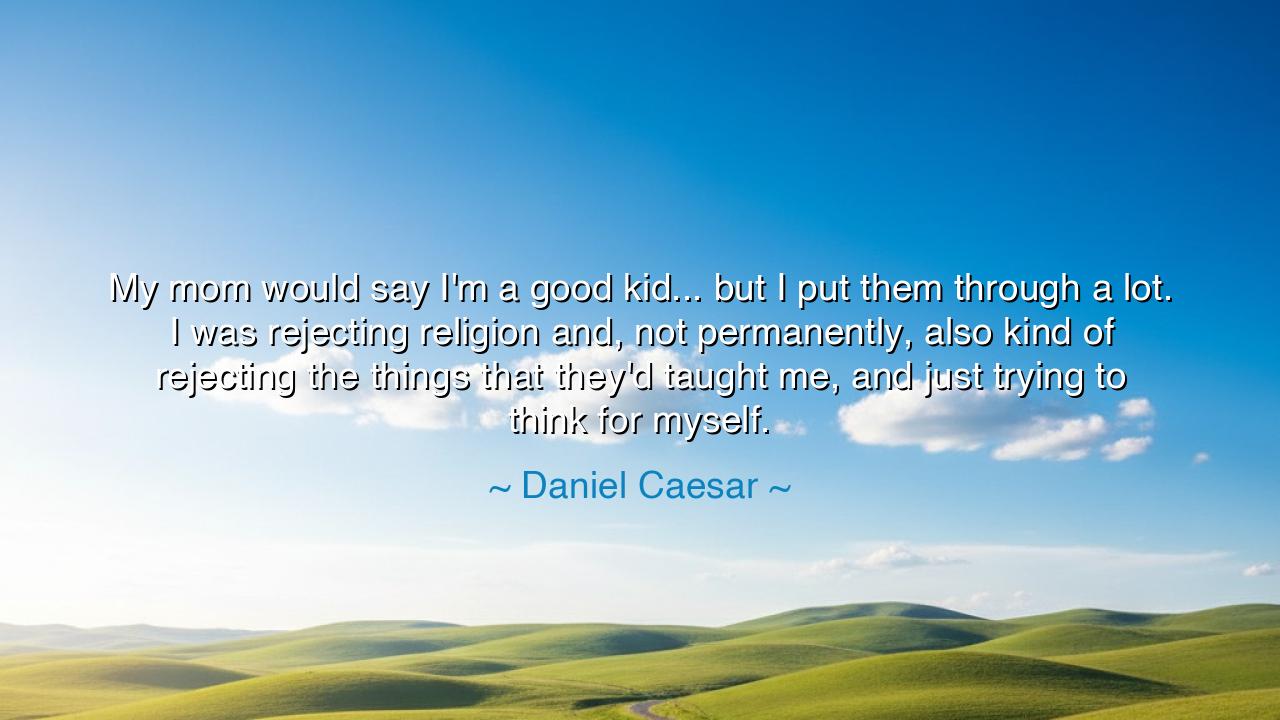
My mom would say I'm a good kid... but I put them through a lot.
My mom would say I'm a good kid... but I put them through a lot. I was rejecting religion and, not permanently, also kind of rejecting the things that they'd taught me, and just trying to think for myself.






Hear, O seekers of wisdom, the voice of Daniel Caesar, who confessed with humility and honesty: “My mom would say I’m a good kid… but I put them through a lot. I was rejecting religion and, not permanently, also kind of rejecting the things that they’d taught me, and just trying to think for myself.” In these words we hear not rebellion for its own sake, but the timeless struggle of the soul that seeks to find its own path. For every generation must wrestle with the teachings of its elders, not to destroy them, but to test them, to make them truly its own.
The origin of such a quote lies in the deep currents of human growth. From the ancients to the present, the journey of maturity has always been marked by questioning. Abraham left the house of his fathers to seek a new covenant. The Buddha turned away from the palace of his birth to search for enlightenment. Even Jesus, at twelve years of age, sat among the teachers in the temple, asking questions that startled them. To reject religion for a time, or to set aside inherited wisdom, is often not the end of faith but the beginning of deeper understanding.
Caesar’s words echo the inner cry of the young: the desire to think for oneself, to test the pillars of belief, to discern what is true. It is a painful process, not only for the seeker, but for the family who watches with worry. The mother who calls her child “good” even while he resists her teaching embodies unconditional love—the love that does not perish when challenged, but waits with patience until wisdom brings the wanderer home again. This is the rhythm of growth: rejection, reflection, and, often, reconciliation.
History offers us a vivid mirror. Consider the life of Saint Augustine, who as a young man abandoned the faith of his mother, Monica, and pursued philosophies, pleasures, and ambitions that left him restless and unsatisfied. Monica wept and prayed, believing her son lost. Yet in time Augustine returned, not with borrowed belief, but with a faith forged through trial and questioning. His words, “Our hearts are restless until they rest in You,” still guide seekers across centuries. His story reveals that sometimes rejection is but a step on the path toward truer conviction.
The meaning of Caesar’s confession is not despair, but hope. To wrestle with inherited truths is not betrayal, but an act of courage. For faith or philosophy that is never questioned remains fragile; but that which is tested by doubt and chosen anew becomes strong. Parents and elders may suffer in this season, but patience and love can transform it into a blessing. For the child who learns to think for himself or herself may one day stand taller, with wisdom both inherited and chosen.
The lesson for us, O listeners, is profound: do not fear the questioning mind. If you are young, know that your rejection of what you have been taught is not the end of your journey, but the refining of it. Question with humility, but also with courage. If you are a parent, do not despair when your child rejects your path, for love is stronger than rebellion, and truth will endure the testing. The sacred does not fear inquiry, for what is true will always remain when the storm of doubt has passed.
Practical steps stand before you: If you feel compelled to reject the teachings you were given, do so honestly, but also seek with sincerity, for the goal is not to abandon wisdom but to find it afresh. If you guide others, give them room to question, for growth requires freedom. And above all, let love bind the generations together, so that whether walking the same path or different roads, hearts remain united.
Thus, remember the words of Daniel Caesar: to reject for a time is not to be lost, but to be searching. To think for oneself is the mark of one who desires truth, not mere tradition. And when the wandering soul finds its way, its faith—or its philosophy—will not be secondhand, but living, chosen, and unshakable. For this is the way of all seekers: to leave, to wrestle, to return with deeper understanding.






AAdministratorAdministrator
Welcome, honored guests. Please leave a comment, we will respond soon